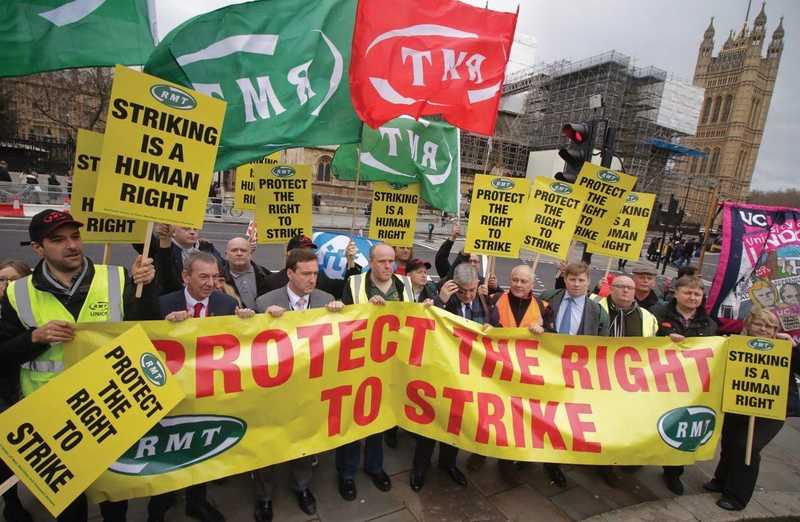
The UK government’s new wave of legislation is ostensibly a response to increased levels of industrial action by workers in transport, healthcare, and other industries, as the rising cost of living bites. They plan to require workers in certain sectors to provide minimum levels of service during a strike. This is the latest step in a pattern of similar policies, including the Cameron government’s measures which made it harder to call strikes by requiring minimum turnouts on strike ballots, and the 2022 law which enabled companies to recruit temporary workers to cover for strikers.
These measures underline the extent to which industrial relations in the UK are moving further and further from international norms. Restrictions on the right to strike are often identified as the “canary in the coalmine” revealing a wider authoritarian drift. The fact that Sunak’s cabinet was reportedly also considering banning some groups of workers from union membership entirely underlines how this repressive logic is part of his government’s thinking; at least where workers are concerned.
Why this sustained attack on the right to strike? One explanation could simply be that Tory MPs don’t like trade unions and want to marginalise them. This is surely true as far as it goes, but it’s a bit too blunt to give the whole story. Especially given that the previous Labour government declined to reverse Thatcher’s initial set of anti-strike laws. This is not just to do with Tories’ anti-union vendettas.
Could it be that, as the party of big business, they are simply doing the bidding of employers? Not really. Some key actors on the management side have expressed important reservations about these measures, fearing they could worsen, rather than improve, relations in workplaces. Preventing the expression of disagreement, rather than defusing it through negotiation, is often a short-sighted strategy, and many employers realise this.
Imagine the practical implementation of Sunak’s legislation during, say, a nurse’s strike. NHS managers proposing to discipline nurses for failing to provide a “minimum level of service” during industrial action would, at best, be an empty threat, and potentially an inflammatory disaster with long-lasting consequences for organisational life and service quality. Many employers will not particularly want or use these new powers.
It could, of course, be a direct response trying to “fix” an emerging situation: the recent uptick in strike action driven by rising costs of living, that looks set to continue well into 2023. This explanation would make sense, except that the Tories were already implementing anti-strike legislation even when strike action was at historic lows. Plus, even the current spike is well below levels of industrial action seen during the so-called “Winter of Discontent”, despite the media hype. Hence, it’s more plausible to say that this cycle of industrial action is a pretext for, rather than a cause of, further restrictions on striking.
In our new book Marketization, we argue that anti-strike legislation in the UK is part of a wider shift towards a strategy of class discipline. By class discipline, we mean any measures which make it harder for workers to collectively negotiate the terms of their employment, and easier for employers to impose these terms unilaterally on them.
Class discipline tends to go hand-in-hand with marketization. When governments and businesses try to intensify the role of market competition in societies, as they have been doing right across the capitalist world now for several decades, they generally also seek to strip away social counterbalances (such as the need to negotiate with unions) which could hinder organisations from responding to market rules.
Understanding the current situation requires us to understand class discipline; where it comes from and what it looks like. There are two things which are particularly important to note.
The first is that, while we see anti-strike rules in the UK as a particularly blatant form of class discipline, it is manifested in various other ways as well, and not just in this country. Indeed, we argue that class discipline is an important theme running through European political economy much more widely.
The second is that class discipline is often blunt. It is a return to direct repression on the part of governing elites, rather than winning workers’ consent by creating institutions and processes that can partially accommodate their interests and thus mediate social conflict (what Marxist philosophers might call “hegemony”). Indeed, class disciplinary measures can have all sorts of negative side effects that governments either ignore or tolerate, because they have increasingly conceived class discipline as an end in itself.
To fully appreciate these points, however, we need to zoom out and look at class discipline beyond our starting point of UK anti-strike legislation.
Class discipline in Europe
First, why has class discipline become so important in recent years? Partly it’s to do with the wider economic context, which goes well beyond the UK’s borders. Current European political economy is dominated by highly mobile international capital flows, where governments are competing to win investment from international markets; a situation facilitated and accelerated by what is often called “financialisation”. Given this, the idea of “market confidence” becomes a much bigger priority: in order to encourage investment, governments have to convince international markets that their country is a good place to do business. This pursuit of confidence can exert a formidable disciplinary power over governments, who can be punished for implementing policies that fail to win market confidence. In the UK, this has recently derailed a government on the right; but internationally it tends to be more often a stick with which to beat the left.
The pursuit of “market confidence”, which has become one of the most important policy objectives facing governments since the 1980s, has pushed European policymakers towards class disciplinary measures. Evidence suggests that the investors comprising financial markets tend to demand profitable returns to shareholders in the short-term, rather than supporting longer-term investment. They generally have little tolerance for negotiations or “social compacts” which seek to balance the interests of capital and labour. Instead, they tend to push industries to slim-down in order to participate more aggressively in market competition.
As such, governments want to show that workers in their countries can easily be marshalled in response to market pressures and the need for profit making. Consequently they have pushed for greater and greater class discipline, even when these measures have created many additional problems.
Anti-strike legislation can be seen in this context; a symptom of this wider dysfunctional landscape of marketization and financialisation. It is, in various respects, a rather short-sighted agenda, that may frequently prove incoherent, even destructive. But, it at least promises to make it easier for employers to make fast decisions in response to market conditions without comeback from workers. In truth, after decades of hollowing out state capacity, the UK government probably does not have many other ideas for catalysing growth and investment beyond this blunt instrument, and so performative class discipline has become an off-the-peg solution. It’s like some mid-ranking school bullies who want to impress the older kids by making a show of extravagantly picking on the same old target: it may well not work, but it’s all they can really think of.
Welfare to work
It’s not the only example. Another case where governments have aggressively pursued policies which inflict class discipline, despite their many negative outcomes, is the shift towards more coercive welfare-to-work systems, where welfare recipients are increasingly sanctioned for not looking hard enough for work.
This is an international trend. Alongside the rhetoric from Tory ministers about the need to bludgeon a “work ethic” into welfare claimants, we can add similar verbiage from French Presidents, and our research also tracked debates in other countries where unemployed people were referred to as “social parasites” or similar. Some European countries have historically used welfare systems to support workers in preserving skills and professional status (for instance by reimbursing part of their previous income while they search for jobs that match their training). But even some of these, like Germany, have turned towards models which force workers into any available job as quickly as possible on pain of sanctions. Our research examined how this process of market discipline was implemented across various countries.
These “workfare” policies have inflicted misery on welfare recipients wherever they take root, as is well-documented by researchers and activist groups. But in addition to this immeasurable human cost, they generally don’t actually work very well anyway. They fuel turnover and job insecurity in low-paid work, as people ricochet in and out of poor-quality entry-level jobs. They prevent individuals from preserving or developing skills, because they are pushed to take any available job whatever it’s like. And, workfare changes the role of those frontline staff charged with “advising” welfare recipients; away from that of a supportive social service professional, towards that of an overseer. None of this is good for individuals, institutions, or labour markets in the long term, but it is the short term intimidatory effects that have most attracted governments.
Class discipline is a theme which has become more and more embedded in European policymaking, and UK anti-strike legislation is but one, particularly blunt, example of this. Both it, and coercive workfare policies, are destructive measures which nonetheless serve the blunt purpose of disempowering workers at whatever cost. The fact that class disciplinary measures are so often ill-conceived and brittle, at least gives us the hope that their architects can be effectively challenged, given sufficient will and organisation. The next few months of labour organisation in the UK will be a vital test of whether class discipline can be rolled back.
Charles Umney is a Professor in International Work and Employment at the University of Leeds.
Ian Greer is Research Professor and Director of the Ithaca Co-Lab at Cornell University’s School of Industrial and Labor Relations.
They are the authors of Marketization: How Capitalist Exchange Disciplines Workers and Subverts Democracy.
Photo: Steve Eason / Flickr





